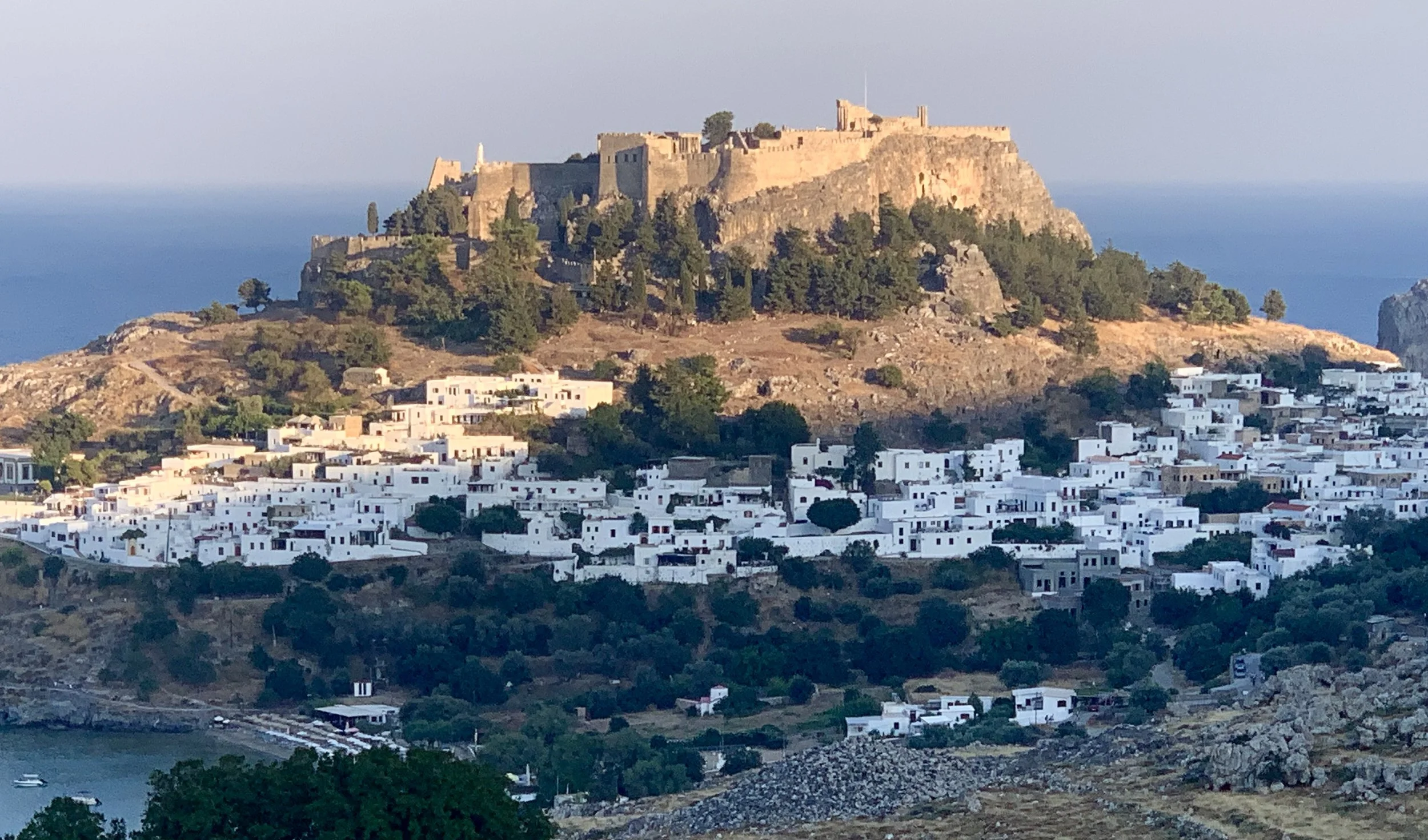29th July 2019
Overtourism - Killing the Goose That Laid The Golden Egg
At 56 Degree Insight we bring a passion and expertise developed over many years working with clients across a range of sectors. We’ve taken a ‘blogging break’ for a few weeks as we’ve both been enjoying family holidays in different parts of the Mediterranean. And this influences the choice of topic for this week’s blog from Jim Eccleston – while growing tourism is a key aim for most destinations, there comes a point where capacity constraints mean efforts need to be made to regulate visitors…
I’ve just returned from a really enjoyable two-week holiday on the island of Rhodes – one of the most beautiful of the Greek Islands. That beauty is unquestionable as is the fabulous history on show in Lindos where we were staying – the acropolis was stunning – and on a trip to the island’s capital, the character of Old Town Rhodes also shone through. In short, a great location for a family holiday. But what also struck me was just how busy and often chaotic were the tourist honeypot sites – the locals in Lindos were vastly outnumbered each day as tour groups arrived by coach and sea – and there seemed to be little tourism management or control of these numbers – quite often, entry into key sites appeared to be almost a free for all. This suggested some potential problems of overtourism beginning to happen in Rhodes – where a destination welcomes visitors in such volumes that stretch beyond the sustainable capacities of key hotspots on the island.
Of course, the problem of overtourism is becoming a global phenomenon – and has become especially prevalent in a number of popular destinations. This has led to key actions being taken by tourism administrations across the globe in recent years, including:
January 2017 - Barcelona unveils law to curb tourism: Officials give the go-ahead for new legislation aimed at curbing tourism. The law limits the construction of hotels and stops licenses being issued to new tourist accommodation rentals.
August 2017 - Tourists and cruise ships are turned away from Dubrovnik: two-year plan to drastically cut the number of visitors allowed into its ancient centre in an effort to prevent ruinous overcrowding.
February 2018 – Thailand- Idyllic cove from movie, The Beach, threatens to close: Government officials announce that Maya Bay in Thailand will be closed to tourists for at least three months in a bid to reverse damage caused to the surrounding coral reef.
May 2018 - Venice bans new fast-food outlets: another attempt to reduce the impact of mass tourism by banning takeaway food outlets from opening in the city. Also, the mayor proposed charging day trippers entering the city
And Greece is now beginning to experience the problems of overtourism, driven by the phenomenal growth of the last few years. In 2018, it welcomed a record 32 million foreign travellers - more than twice the 15 million tourists who visited in 2010, and eight times the number that visited as recently as 1995. Quite simply, it’s the only European destination this decade which has seen such an overwhelming surge in visitor numbers.There’s no denying tourism has greatly helped Greece and its struggling economy - it’s provided a quarter of Greek residents with jobs and is the nation’s biggest foreign currency earner. But such rapid growth is starting to take its toll – and many are arguing that the country is beginning to suffer from too much success in attracting visitors. In several key locations, it is really struggling to cope, and to put things into perspective, Rhodes is not suffering as much as some other parts of Greece in terms of overtourism.
Santorini is the Greek island which feels the crush the most. Around 6 million overnight stays were taken there last year. But the island is tiny – roughly three quarters the size of the Isle of Bute (30 sq mi) and traffic jams and overcrowding have become an issue, as has rising water and energy consumption. The local authority put a daily cap on cruise passengers in a bid to stem the tide of tourists, and have warned that the island is at "saturation point".
Athens is also suffering. Like Santorini it is a popular stop for cruise lines, with more than one million passengers using its nearest port, Piraeus, each year. It has also appeared on numerous recent “must visit” lists, and seen a spate of hip new hotels opening their doors. Emirates recently introduced flights from North America to Athens, and it is also increasingly appearing on the radar of Chinese travellers - a direct service from Beijing also started recently. So the rapid growth – and impact on the infrastructure is accelerating – and there have been many reports of students struggling to rent locally as landlords turn their attentions to the more lucrative Airbnb markets.
Back to my holiday – and although not suffering to quite the same extent, it was self evident that two of Rhodes ‘must see’ locations, Lindos and old town Rhodes itself were also struggling to cope with the numbers in mid July. Lindos in particular – with its magical whitewashed buildings beneath the acropolis overlooking the town – was jam packed on a daily basis making a visit much more stressful for the visitor, and I’m sure not a particularly welcome experience for the locals. I read one account on the local online discussion forum from a frustrated resident: “Many tourists treat it like it's Disneyland. They gape in windows and take photos of everything. Many forget common decency and walk through our neighbourhoods in their speedos and bikinis”.
So what can be done? The Greek National Tourism Organisation says it is aware of the potential for problems and states that the country's policy "dictates not moving beyond the carrying capacity of the environment" by focussing on the "extension of the summer tourism season and the development of thematic tourism which attracts visitors all year round". Extending the season is not exactly a unique solution but clearly an essential strategy to follow.
But what amazed me was the absence of any obvious Destination Management practices ‘on the ground’ in either Rhodes town or Lindos. Indeed the old tourist office in Lindos was a derelict shell – meaning that tourism management practices appear to be non-existent with visitors driven to the town by competing commercial operators who, let’s face it, have less concern for the local impacts – or the longer term environmental effects as they chase the ‘fast Euro!’ by selling as many tours as they can manage. Surely a more proactive presence by the publicly funded tourism authorities in managing the throughput and servicing of visitors to these destinations could only be beneficial? There are so many other, less discovered parts of the island which could benefit from MORE tourism and by dispersing visitors there, help ease the strain elsewhere – but the tourism authorities need to actively manage this opportunity.
I get the feeling that Rhodes – and no doubt other Greek islands are approaching the point that Mallorca reached a number of years ago. That Balearic Island’s success this century in developing a much more sustainable offer, with strong destination management practices has brought tourism development under more sustainable control. It still has its challenges - last year, officials announced plans to double its tourist tax during the peak season in an effort to tackle overcrowding. But this type of proactivity and control, I believe, provides a bit of a blueprint which the Greek islands must learn from.
Undoubtedly Rhodes is a fabulous destination for a summer holiday - but the need to develop a strong destination management strategy in peak season is without question. More proactive management of tourism on the ground at key locations and times of the day would make a positive difference to the experience – for visitors themselves but especially for the locals.
And it’s not just an ‘overseas problem’ either. Niall Middleton, director of Fringe by the Sea has warned that the Edinburgh Fringe is threatening to overwhelm the city and is calling for control over the number of performers, shows and venues. Dissatisfaction among residents has grown steadily over recent years on the disruption it brings to their lives.
Overtourism has to be addressed wherever and however it manifests itself - otherwise the very reason people visit will be compromised - solutions that deliver a degree of sustainability are key.
Footnote: any readers contemplating a trip to Rhodes, please just get in touch.
I’d be happy to share tips and suggestions to help you get the most out of your visit.
Jim Eccleston



